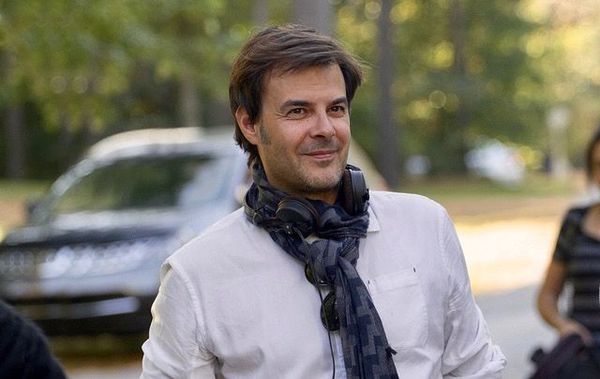 |
| François Ozon Photo: UniFrance |
He has dressed down for our meeting in the Grand Hotel in Paris, with a baseball cap, jumper and jeans. François Ozon, 49, sips water and and settles back in an all-enveloping settee. He once tried to be an actor but found it did not suit his demons and he retreated behind the camera instead. His latest film, Frantz, was shot in black and white and is based on a play written by Maurice Rostand just after the First World War. When Ozon found that it had already been made into a film by his hero Ernst Lubitsch under the title Broken Lullaby, he felt like giving up. When he saw it, however, he realised his take would be different: rather than focusing on the Frenchman Adrien he wanted to take the point of view of the young woman Anna. The pair meet at a graveyard in a small German town after the end of the War where Anna is mourning her fiancé Frantz.
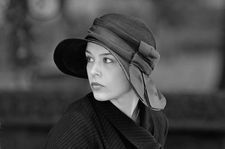 |
| Paula Beer Photo: UniFrance |
Ozon says he had been wanting to do a film about lies which he finds “exciting fodder for storytelling and filmmaking.” The film features many of the themes found in other Ozon films, such as grief (Under The Sand); the pleasure of storytelling (In the House), and the maturing of a young woman (Young And Beautiful). He also has a fascination for Germany and its language, history and culture - it was the first foreign country he visited as a child and his first feature Water Drops On Burning Rocks was adapted from a play by Rainer Werner Fassbinder.
Richard Mowe: What was the thinking behind shooting the film in monochrome?
François Ozon: Originally the film was supposed to be shot in colour but I decided one month before shooting started to change everything because after the location scouting we found some good places, especially in Germany, but there was too much colour and you felt as if you were in a Walt Disney village. One day when I was walking around in the town, I saw some pictures of the place in black and white from the beginning of the century. I realised nothing much had changed but in black and white everything seemed more realistic. So I decided to change it all but because I love colour too I decided to keep some scenes in colour and to play with that.
I had the feeling also that all our memories of this period are in black and white - the films of that time were in black and white and so were all the documents. I thought that doing it this way would make the audience feel more involved. I had to fight a bit to get my own way because French films receive a lot of money from television and the fact that it is in black and white means the film will not be shown on prime time. And the fact that most of it was in German also counted against it. Actually we shot in colour because it is impossible to find monochrome film stock. Technically it was complicated because I would see my actors in colour and then look at them in the monitor in black and white.
RM: Did you want to play with our perceptions and to keep the character of Adrien mysterious?
FO: The big difference between my film and the play by Maurice Rostand and the film by Ernst Lubitsch was that I changed the point of view of the story. In the play and the earlier film you know from the first minute what he has done... So the idea to change the point of view and tell the story from the perspective of the German character and especially from Anna [played by newcomer Paula Beer] was more interesting. From the start of the film you do not know exactly what was the relationship between Frantz and Adrien - you can imagine and believe in the lie like the parents. It was, of course, also a way to play with the expectations of the audience: some people think there was a love story, some people think something else and others think that he killed him. So that was the idea - to have this ambiguity.
RM: What governed your choice of Pierre Niney for the role of Adrien?
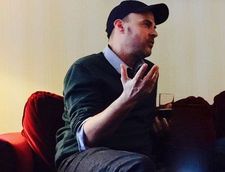 |
| François Ozon in talk mode at the Grand Hotel in Paris Photo: Richard Mowe |
FO: It was obvious because he is one of the most talented actors of his generation. He has a theatrical background. I knew he would be very involved and he likes to work. I needed someone strong who wanted to invest himself totally in the role. He had to learn German for the film and he also learned to play violin. I liked his sensibility and the fragility he has showed in other films like the one on Yves Saint Laurent. I thought he would be perfect. It was funny because immediately we gave him a moustache you had the sense he came from the last century. So he was perfect for the role of Adrien.
RM: Which Lubitsch film do you consider his master-piece?
FO: I love his comedies and The Shop Around The Corner is one of my favourites.
RM: Would you ever consider remaking it?
FO: Absolutely not. When I discovered that Lubitsch had made the adaptation before I was totally disappointed. I thought how can I make a film of it after it had been done by Lubitsch. I wanted to give up. I realised, however, when you look at it today it is quite difficult to watch. And he did not know at that time that the Second World War would happen. So that helped me, also the fact that his film was good but not a masterpiece. You have to watch it in the context of the Thirties.
RM: Would the story of Frantz be different if it was a German soldier visiting France?
FO: It is funny you should ask that question because when I went to talk about it with my producer he said why do you want to shoot in Germany. He would rather I had changed the whole story and shot it in France. For me that was less interesting. I wanted to tell it from the angle of the people who had lost the war. And I thought it would be original for a French director to tell the story from the point of view of the Germans. And I wanted also to tell the story from Anna’s perspective - it appeared obvious.
RM: And I guess it was also obvious that everyone would speak their own language?
FO: Yes I had no problem with that. In Hollywood in the Fifties everyone spoke in English - even in Louis X1V’s court but today you could not do that.
RM: The end of the film seems a bit ambiguous - what was your take on it?
FO: For me I had the feeling Anna was turning the page. There is a new boyfriend - we do not know, of course, what will happen. It has been compared to the ending in Under the Sand but in that film the woman is still running after a ghost.
RM:Were you influenced at all by Renoir’s La Grande Illusion?
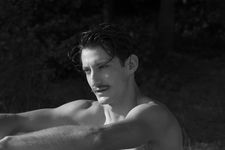 |
| Pierre Niney Photo: UniFrance |
FO: I did not think of it particularly but I did discover in my researches Lewis Milestone’s All Quiet On The Western Front. I thought it was amazing, modern and very strong. I did a lot of research on the German side because there are so many films from the French point of view. I wanted to understand the rise of Nationalism. Even young Germans do not learn so much about the First World War in their history classes. My German producers were very happy because I was telling a story in which they were not the bad guys.
RM: You seem to do a new film every year: how do you manage to be so productive?
FO: Actually I like my work - and unlike some other directors who suffer when they are shooting I suffer more when I am not working. I prefer to write and to work. It is not easy. It is also a long process but first and foremost for me it is a pleasure.
RM: How do you feel at this point in your career?
FO: I just want to go on - and keep making films without too much hassle. Actors I dream of working with ? Dead actors would suit me … I would love to have worked with Nathalie Wood and Romy Schneider. I have learned that my place is definitely behind the camera and my way of communicating is through the camera. I don’t look back. Once a film is done that’s it. I turn the page very quickly.
RM: Has your technique of working with actors changed?
FO: For each film it is different - with Eight Women it was not the same as working on this film with a young actress who was just 20 when we shot the film. We did a lot of rehearsals. The German actors were very involved and they all had a theatrical background. The idea was to have a certain reserve for each of the characters.
RM: You always have strong female characters in your films - are you conscious of that?
FO: I am always surprised when people make that observation because they would never say that about male characters. Women are half the population so why not?
RM: You have remarked before that what you experience when you direct actresses is something like falling in love. As an openly gay director does the same thing ever happens with your male performers?
FO: Not often. With Melvil Poupaud [who played a photographer dying of cancer in Time To Leave], I felt like he was an actress. He was very easy to work with, as was Michael Fassbender [in Angel]. They had no problem being directed by a man. But many men have that problem. They can't accept their feminine side. It becomes this big fight, and sometimes it's boring — I want to work, not fight.
RM: You seem to prefer to remain working in Europe, particularly France. Would you consider locating elsewhere?
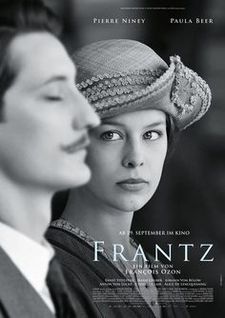 |
| Frantz poster |
FO: I don't want to make English or French films exclusively. I just follow my instincts. I have a French point of view, and I don't want to work with a studio. I want to have my freedom to do exactly what I want. I think that if you went to America you would lose your soul because you have to work in the American way, which is so different from the European way of making movies. When you have the freedom to do exactly what you want, why would you move to America to be totally controlled and to have to work with people that maybe you don't respect and who are difficult to work with? I would not have final cut in Hollywood. In France, a director must have final cut. It's the law.
RM: And now for something completely different again?
FO: Yes I shot a new film already. Frantz is my most chaste movie and there are no sex scenes. So I decided to make an erotic thriller L’amant double which will be something totally different. It is adapted from a book by Joyce Carol Oates and stars Marine Vacth with whom I worked on Young And Beautiful as well as Jérémie Rénier and Jacqueline Bisset. I think it will be ready for the end of the year. Oates did not have the rights to her own book any more because it had already been adapted for television in the States. It is about a fragile young woman who falls for her psycho-therapist. I have changed many things, so I am a little bit afraid she may not recognise it. I hope she will like it: I don’t think I have betrayed her spirit. It is just as perverse as her book.
Frantz is scheduled for a UK release on 12 May / US release slated for 15 March and it is also screening at NY Rendez-vous.
Glasgow Film Festival screenings are on 16 and 17 February
Richard Mowe talked to François Ozon at the Unifrance Rendez-vous with French Cinema earlier this year.





















